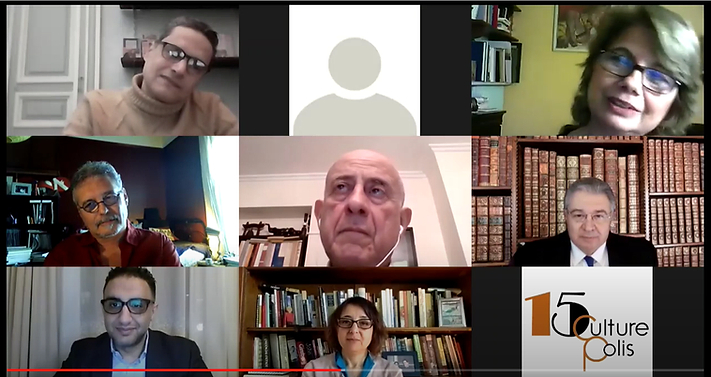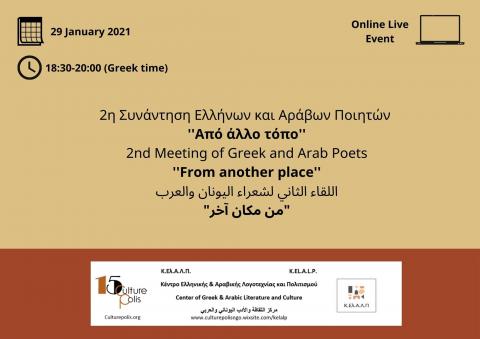مركز الثقافة والأدب اليوناني والعربي (Κ.Ελ.Α.Λ.Π.) التابع لمؤسسة CulturePolis يستمر في عام 2021 سلسلة اللقاءات بين المبدعين اليونانين والعرب ويسعده أن يدعوكم إلى الملتقى الثاني للشعراء بعنوان "من مكان آخر"، والذي تحدد موعده في 29 من شهر يناير الجاري في تمام الساعة السادسة بتوقيت اليونان. يشارك في هذا الملتقى شعراء الشتات/ المهجر من اليونانين والعرب، شعراء كتبوا أو يكتبون بلغتهم الأم بينما يعيشون بعيدًا عن أوطانهم.
The Center of Greek and Arabic Literature and Culture (K.EL.A.L.P.) of CulturePolis continuing in 2021 the cycle of meetings with Greek and Arab writers successfully organized the 2nd meeting of poets under the title "From another place", which took place online on 29 January 2021, time 18:30 (Greek time). The participants were Greek and Arab poets of the Diaspora, poets who write or have written poetry in their mother tongue while living far from their homeland.

-------------------------------------------------------------------------------------------------------------------------------------------------------------------------------------------
Statement Text
It’s almost a cliché to say that in a foreign land your mother tongue become your home. It’s true, of course, but not on its own. Language travels without people. It has its own paths and turns. When in its travels, language is guided by poets, it’s best that they know that if they don’t give it care, it will leave them.
Since I was a child, I loved foreign lands. At first because of literature itself. I learned of foreignness from those books my mother gifted me with abandon. Foreign names, foreign landscapes, foreign stories—unknown, otherworldly, astonishing. That’s why I loved books. Because they grabbed and dragged me elsewhere. When, growing up, I discovered that I loved to travel, that I sought continuously to find myself in the midst of people who did not know me, in streets I first walked without knowing where they lead, in the midst of people I did not know and did not understand, then I realized that this way I was able to live again in the dreams of the books I had read as a child.
At some point, still little in Athens during the ’60s, I also learned that I had been born in a foreign land, in fact in Hollywood, precisely the place where foreigners arrived to construct dreams that they later spread all over the globe. In my adult life, this foreign root of dream-making secured my life’s path—my love for the arts: music, thought, images, poetry. From early on I was also graced with foreign tongues, which paradoxically ceased being foreign, perhaps because my mother tongue was nothing more than a gate through which I passed continuously without ever getting lost.
For decades now, I write simultaneously in two languages and I translate back and forth in four. But I rarely write poetry in English. Perhaps because this way I create a steady alienation from the fact that I am surrounded by an anglophone world. I don’t think I write poetry in Greek because Greek is my mother tongue, although my dear late mother would disagree, I am sure. Justly so.
It is a fact that Greek is the language of games, not mathematics. And because poetry is always a game, and games, like books, I learned to play from the youngest age, while learning Greek, I’m fortunate to exist continuously in a magical world where even the unknown and the impossible can be noted in writing, even if they remain uncertain—like in mathematics.
Within this familiar uncertainty, poetry is knowledge—in essence, recursive reading of every encounter with the foreign, which happens daily in life in a ceaseless process. In exactly the same way that every word never quite ends, even when we press them into verses hoping that this way they will noted infinitely like the cave drawings of Lascaux.
In the end, we never learn. We simply come to know. And thankfully, what remains unknown in the world also does not end, so however much we encounter and come to know, we still remain alone in the face of many languages. Except for eros—there, indeed, we learn the poetry of others, where what is foreign and what is familiar become one and the same.
SG
https://www.youtube.com/watch?v=YSc50vV18yo
